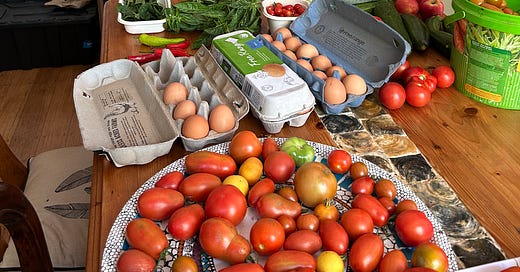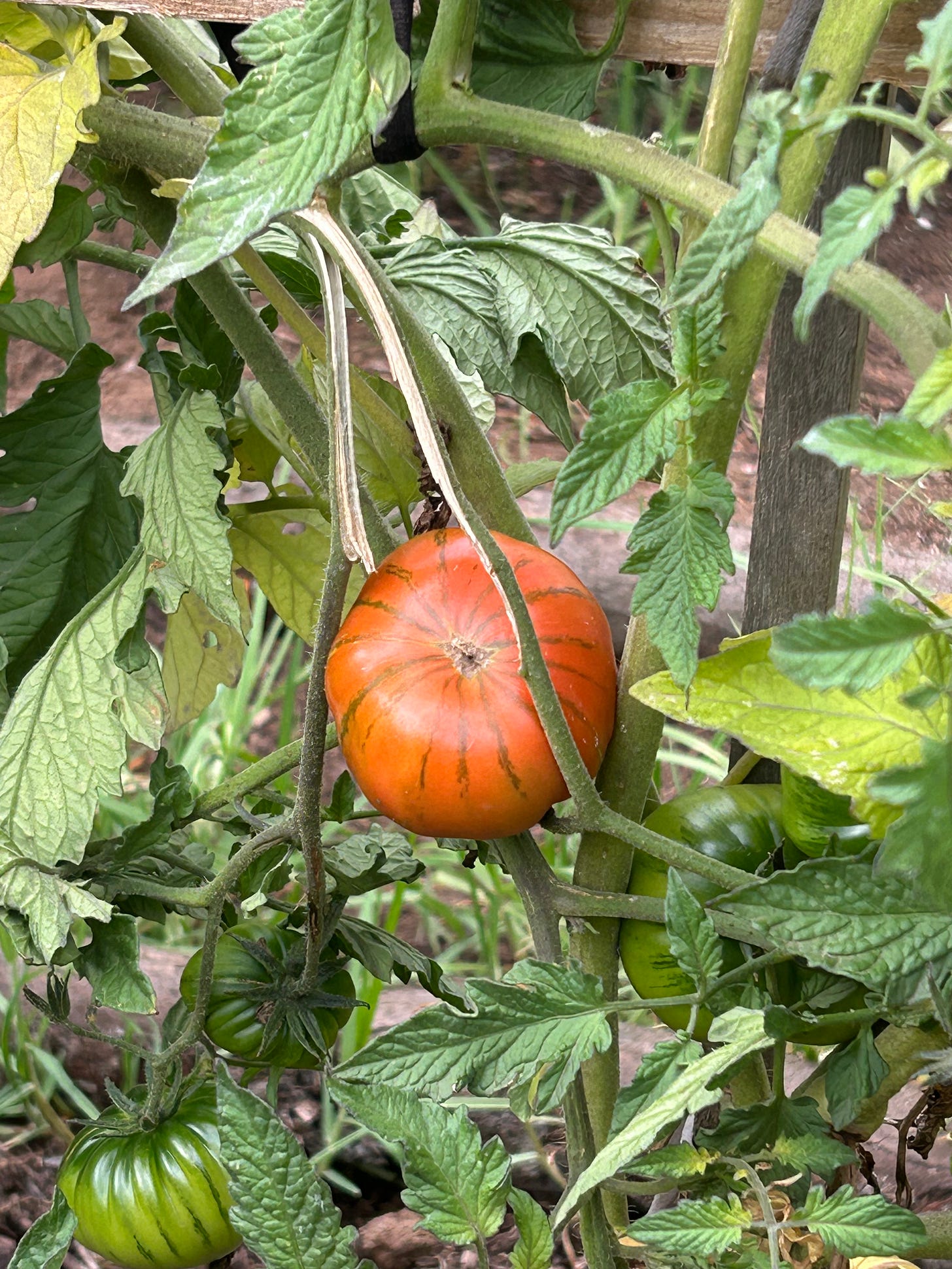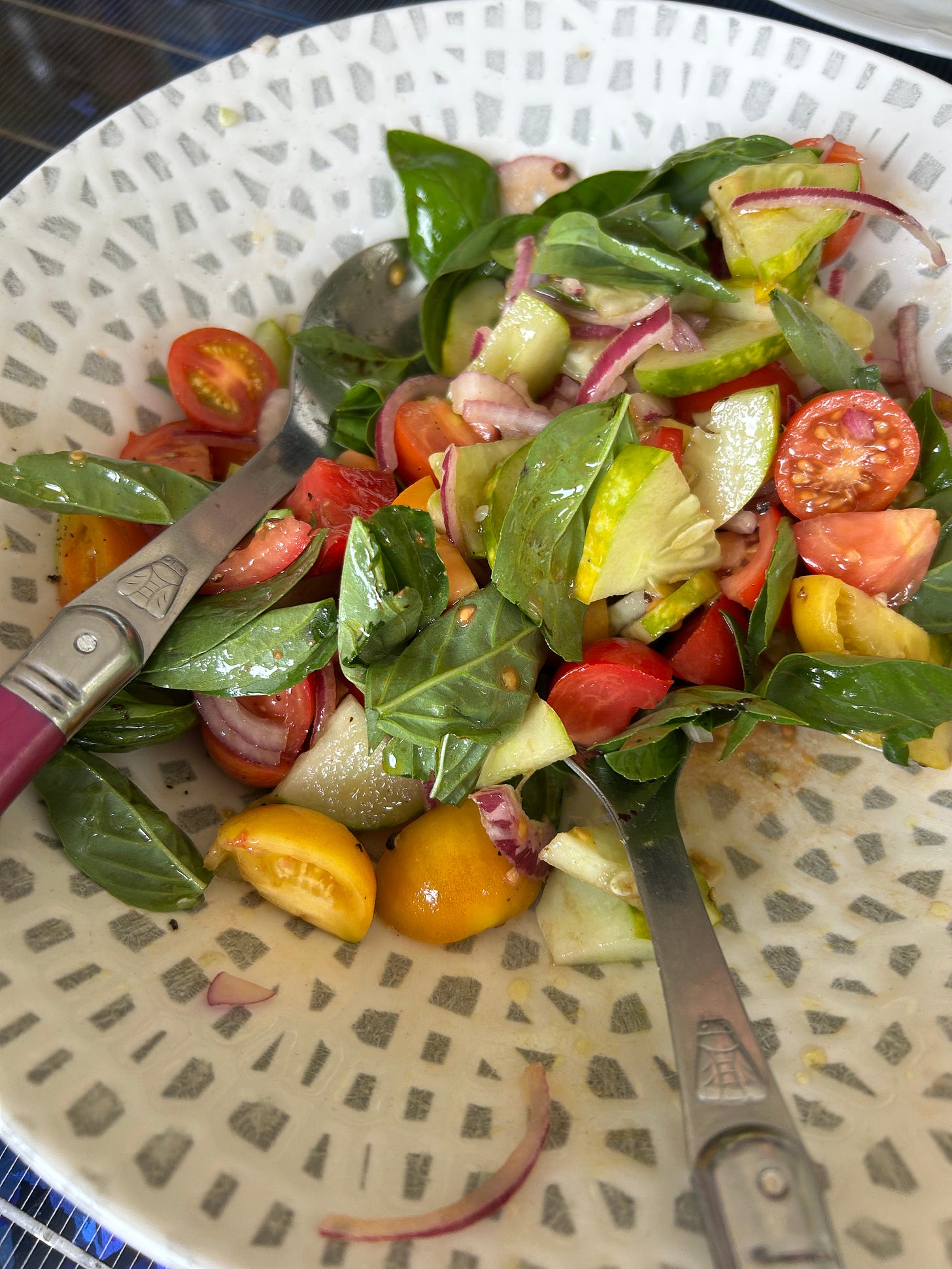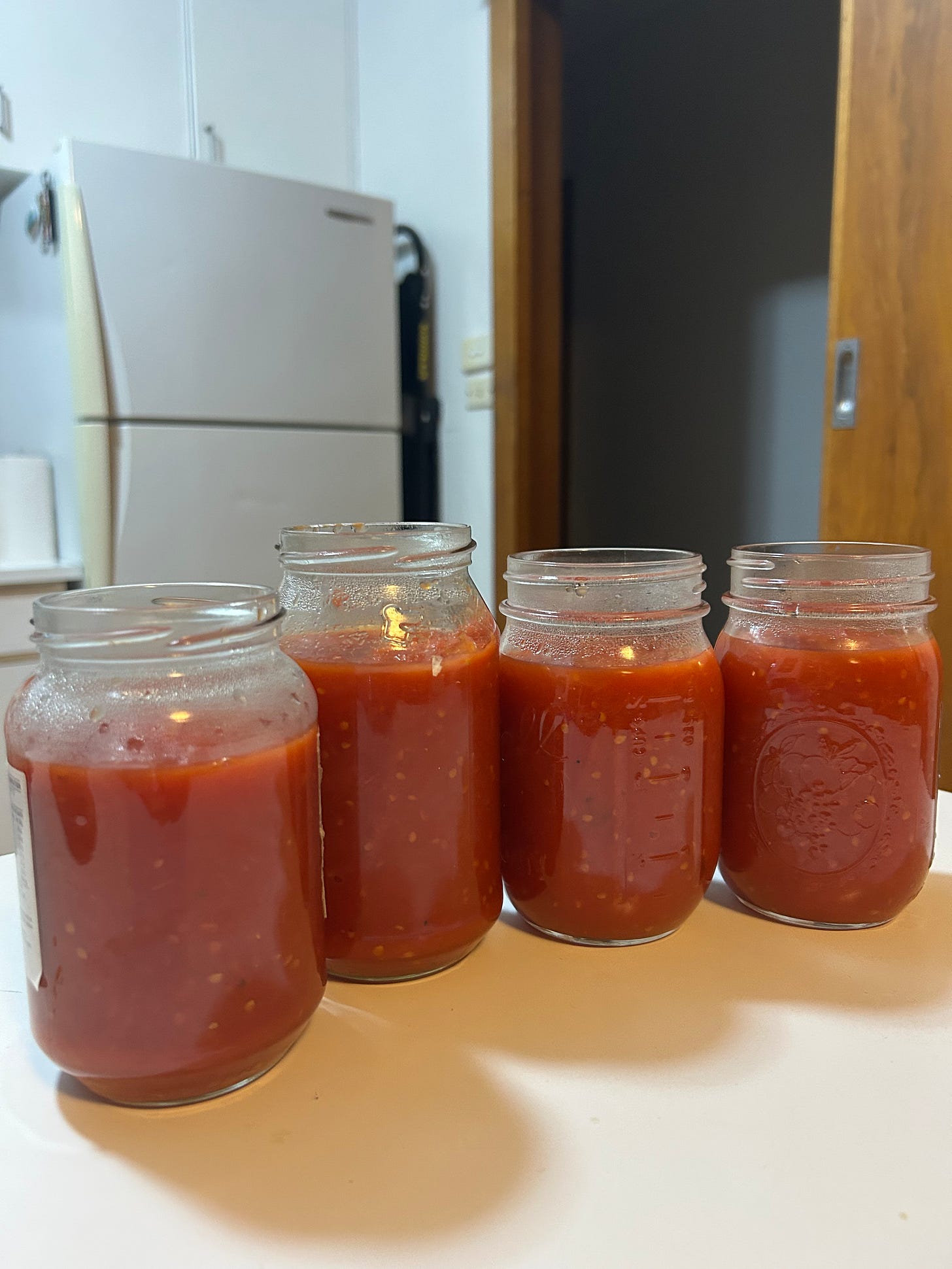The Gift of Tomatoes: A Story of Love, Resistance and Reciprocity.
A love letter to tomatoes and an act of rebellion against the broken food system.
As the setting sun casts long shadows of the gums toward our abundant veggie garden, I stand watering four rows of tomatoes at our Red Hill homestead, Kookaburra Rise.
Blades of grass poke between my bare toes. A gentle wind blows my peppery grey hair across my eyes. The sweet, earthy scent of tomatoes fills my nostrils. Only my ears are disconnected from nature, occupied by the soothing voice of Robin Wall Kimmerer narrating her stunning book, Braiding Sweetgrass.
The book blends Indigenous knowledge, Western science, and personal storytelling, guiding readers to see nature not as a resource to exploit but as a teacher, a relative, and a community we are part of.
These tomatoes are more than fruit. I am in relationship with them, as are all the creatures fortunate enough to share their bounty. They are a gift to be respected and thanked, a delicious red-ripe fruit as vital to our ecosystem as any human.
I pause the audiobook, pluck a tiny Tigrella from the vine, thank it for its gift, and pop it into my mouth. My taste buds jump with joy as sweet juice trickles down my throat.
In that moment, I am propelled back to childhood—a time when I abhorred raw tomatoes and would gag if my well-meaning parents forced me to eat them. For years, I could stomach tomatoes only when boiled beyond recognition into sauce or chutney. Fresh tomatoes? No way.
The tomatoes of my past were pale and lifeless, their flesh mealy, their taste a watery afterthought. But this Tigrella, plucked straight from the vine, explodes in my mouth. I am overcome by its deliciousness. In an instant, my lifelong aversion to fresh tomatoes slips away.
Finally, I have learned to love fresh, unadulterated tomatoes.
I wonder if it’s because all the tomatoes I’ve ever eaten before were tasteless in comparison—not true produce, but artificial products of an industrialised, chemicalised food system. A system that prioritises mass production and profit over taste, health, and well-being.
Supermarket tomatoes are engineered for shelf life, not flavour. Stripped of their essence and dignity, they are bred to endure long-haul transport, stored in cold rooms for months, and eaten year-round instead of in season.
But these homegrown tomatoes? They are a rebellion against the broken food system. A return to what food is meant to be.
For this act of resistance to ripple outward, it is my duty as a writer to share the story of our relationship—so we may build a community of people who love tomatoes, too.
What if we all treated food as a gift rather than a commodity? What if we gave back as much as we took? This is the revolution waiting in our backyards.
I contemplate the idea that these tomatoes might love me back. Nurtured with care and attention, they return the favour in an act of generosity and reciprocity.
For two summers now, our tomatoes have offered an abundance of sweetness, their vines heavy with offerings—not just for us but for the entire web of life.
Tomatoes are my partner Ric’s precious gift to me. He lovingly planted the seedlings in punnets, transferred them to rich, untainted soil, tended them, staked them, and pruned them, willing them to life.
The bees, the pollinators, the earth, the wind, the sun, and the rain have collectively bestowed their magic spell upon them, aiding their steady growth.
Under our care, with regular watering from our rain tanks and the blessing of the summer sun, the Roma, Gross Lisse, and tiny, sweet, stripey Tigrellas ripen into bright shades of red, orange, and gold.
And when they are ready for harvest, the gift-giving begins. All beings share in their bounty.
To the rascally blackbirds who sneak away with their share when they think we’re not looking, pecking at the juiciest fruit—we grumble but let them feast on a few before casting our nets across the plants.
To the cheerful chickens who gleefully devour the other half of each tomato the blackbirds have thoughtfully left behind, turning dark-red scraps into rich, golden eggs.
To the two of us, novice homesteaders, savouring taramasalata on pita with fresh tomato and basil or a colourful tomato salad with chickpea and zucchini flatbread.
To our children and grandchildren, who pick tomatoes with us on weekends, delighting in their discovery, always declaring them far more delicious than the store-bought kind.
To our many friends, who drop in to feast with us, always bringing wine and never leaving empty-handed—a taste of summer’s tomatoes, freely shared, a gift money can’t buy.
To our local community in Clifton Hill, the grateful recipients of our tomatoes when we return to the city, sending us texts and photos of the meals they’ve made.
And then there is the preserving—not for hoarding, but to sustain us in winter and share with family and friends. The rich, velvety passata folded through fettucine, the sun-dried tomatoes with feta on sourdough.
Long after the harvest ends and the dark winter begins to close in, we will pull up the disintegrating tomato plants once laden with fruit. We’ll toss them onto the compost heap, layering them with brown and green matter and kitchen scraps.
When summer returns, that compost will replenish the soil, nourishing next year’s crop. And so, the cycle of our tomatoes continues and deepens—just as our relationship does.
I press play again on Braiding Sweetgrass and feel immense gratitude for the opportunity to apply Robin’s lessons in real life. This is no longer an idea or a theory—it is an actual practice.
The gift of tomatoes is not just about food. It is about relationship. It reminds us that nothing we receive is truly ours alone. We are part of an intricate network of giving and receiving, of nourishment and care, where all beings belong.










Transformation through tomatoes.
Thanks Carolyn.
All hail the mighty tomato!